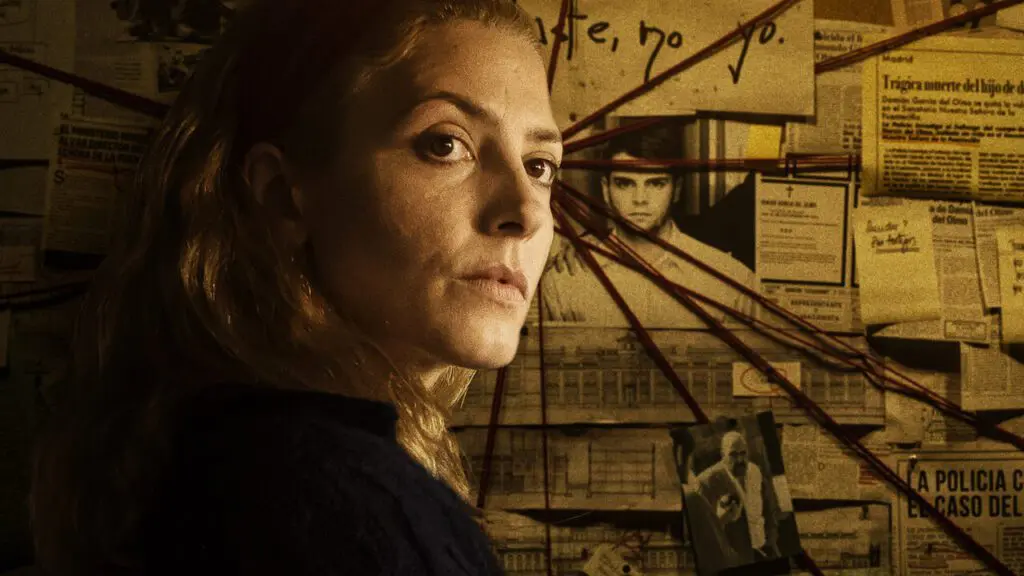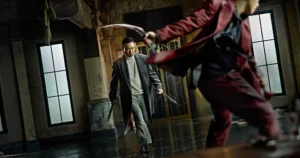Summary
God’s Crooked Lines is an extraordinarily patient psychological thriller that rewards the viewer for their time and dedication.
God’s Crooked Lines is a bit of a chore and time commitment, considering the run time alone. That’s even if you’re a fan of sensationalized melodrama, which this film leans towards. While the script tends to steer away from more serious issues of how the medical community and ourselves view and treat mental health, there is much to like here in the Torcuato Luca de Tena adaptation, including a scintillating lead performance, a well-constructed script, and an overall tone that is not easy to shake.
Review
The title of God’s Crooked Lines refers to why a higher authority with so much power would draw the line at helping people with mental health issues in need of de Tena’s novel of the same name.
The story follows Alice (Barabara Lennie), a private investigator who begins masquerading as a patient institutionalized in an asylum for attempting to poison her husband, Heliodoro (Pau and his Brother‘s David Selvas). Now, why would anyone do that? Look over the great (fictional) PIs of our time, like Hercule Poirot or Benoit Blanc. They don’t do it for the money or the fame but to seek the truth and bring justice to those who need it.
Alice’s mission is to investigate the death of Dr. Damian Garcia del Olmo’s (Lluís Soler) son, who committed suicide. The good doctor thinks there was a coverup. Alice even lies to her husband about her whereabouts, as del Olmo requested complete anonymity.
Of course, a classic horror trope, when she enters, she gets more than she can handle, and the staff may be just as dangerous as their patients. The longer alive stays, the more others question her motives.
According to Alice, de Olmo contacted the head of the facility, Dr. Alvar, about the plan. Here, part of the cover is that Alice has a psychiatrist, Dr. Donadio, write a letter. Part of it says never to believe her lies.
Alice wants to make everyone believe she was admitted because her husband had legally kidnapped her. This gives her a plausible excuse for why Alice is not mentally ill. She can now investigate del Olmo’s son’s death without suspicion. There is an additional exploration of this subject in an alternative timeline. In what first appears to be flashbacks, showing a dead young man in his cell. He dies from a crushing blow and stab wounds. How can this be suicide?
Directed by Oriol Paola, who helped write the script with Guillem Clua and Lara Sendim, it may appear to have too many hands in the cookie jar. However, the labyrinth plot and the extraordinary way timelines are brought together suggest brilliant teamwork.
Here, we have a genre of a Spanish film called esperanza masquerading as an unsettling psychological thriller, a somewhat exaggerated, sensationalized, and melodramatic work that wants to expose and say something about society’s truths.
Here, we can only speculate, but Tena’s novel explores power, cancel culture, and how they converge. Perhaps navigating the current world we live in with disinformation is easier said than done.
The film suffers from some red hearings and too many characters to not offer anything but distractions and have greater context in the novel. At a massive running time of 155 minutes, the film shows extraordinary patience in plotting to sway the viewer’s opinion in multiple directions.
The flashback scenes are well done. When these plot points converge, it may remind you of such films as Rendition. The writers use great finesse and make this task look much easier than it is.
All of this means the performance by Lennie is quite extraordinary, especially in a film of this length and with how much screen time she has. From when she enters the facility as a wealthy aristocrat to her haunting final framed shot, few actors can carry such melodramatic material for that time frame and still make you care about where the film ends. It’s a performance that won’t get the credit it deserves.
The film is essentially a long battle of wills and wits between Lennie’s Alice and Fernandez’s Alvar. While the film may have been better served as a miniseries to hit and emphasize plot points with greater emphasis, God’s Crooked Lines is an extraordinarily patient psychological thriller, one that rewards viewers for their time and dedication, especially for fans of the genre.
Ending Explained – How Does Alvar Prove Alice’s Story is Fabricated?

God’s Crooked Lines (Credit – Netflix)
In a surprise development, the flashbacks involving the death are masked but are in the present day. So, this wasn’t a flashback, but it can be called a flash-forward in the future. Alice started the fire to escape.
The dead body is one of the twins, Romulus and Remus, who the Elephant man killed because one of them killed his friend who attacked Alice. That boy was Remus, but the killer mistook Romulus for him. Alice uses all this as she investigates the brutal murder and solves the crime to the police called into the facility. This gives Alice enough credibility to get a board meeting to vote on her sanity to be freed.
At the meeting, Alvar will excuse himself from the vote if they accept his resignation letter and send it to the man who hired him. He points out the failure of mental health professionals to support each other’s clinical judgments. The board votes and they are unanimous in letting Alice go. Before Alvar leaves, he takes one last swing at proving his diagnosis.
How does Alvar prove Alice’s story is fabricated? He turns around and announces they cannot reach Dr. Donadio because he is traveling with his wife and he is outside. Alvar leaves and Donadio walks in.
It is the man Alice knew as Dr. Damian Garcia del Olmo! “Alice, what have you gotten yourself into now?” he asks. The camera looks closely at Alice, and you see her snap in her mind again, searching for why she is not mentally ill.
As you can see, Alice’s story and theories did not keep changing because of the plot, but she kept adjusting the tall tale to make excuses for why her ego could not handle the fact she needed help.
*For the more significant context, while the film ends on that note, the book ends with Alice leaving, but she chooses to go back inside to seek the help she needs.




